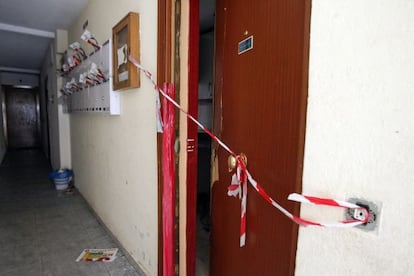Squatters take over Madrid neighborhood
Empty flats in of El Qui?¨®n are being targeted in what local mayor calls "an organized occupation"


There is a neighborhood in the south of Madrid where even the slightest neglect of your property can see it invaded by squatters. That was exactly what happened to "Ana," who would rather not use her real name. She was spending some time living with her mother, and when she returned to her flat, her home was no longer her own. Since then she makes a visit to the apartment every morning, opening and closing the blinds, and hanging out clothes on the balcony so that it looks as though it is occupied all the time.
In the building next door, a bank has decided to cover over the door of one of the flats with a thick layer of cement, ensuring that no one can come in through the front. Bel¨¦n, the head of the residents' association in another building, takes the time every day to remove flyers and junk mail from the mailboxes, so that people can't work out which flats are empty and which are occupied. "In my building," she explains in a whisper, "there are four empty properties. And we don't want anyone to find out."
This is the situation in El Qui?¨®n, a neighborhood of 3,000 people. It is located in San Mart¨ªn de la Vega, which itself has 19,900 residents, of whom 2,234 are without work -- 15 percent more than in 2011.
And then there is the other side of the issue. Imad, a 23-year-old Moroccan, has been unemployed for as long as he can remember, after losing his job at Mercamadrid, the capital's main food market. He also has his complaints. The neighbors, he says, put glue in the lock of the apartment in which he is squatting. "And they beat him up, totally messing up his hand," adds his friend Mohamed. "If we don't squat, what would we do? Should we die of starvation?" he asks.
A bank has covered the door of one of the flats with a thick layer of cement
Among the squatters, the neighbors explain, there are Moroccans, Romanians, Gypsies, "and the odd Spaniard." On Pintor Rafael Bot¨ª street, all of the buildings have at least two flats occupied by squatters in. In some, the number is as high as seven.
"In our building there are two," says one of the residents, lowering her voice. "With some of them we have come to an agreement. They contribute 30 euros to the residents' association and give us 10 euros for the electricity. With the others, not only do they not pay, but they also carry knives."
Last week the situation in this neighborhood crossed a dangerous line. A property with squatters in it was completely cleaned out. They took the pipes, the light fittings and even the water heater. When they removed the latter item they caused a gas leak, which resulted in the entire building being evacuated in the middle of the night.
On Monday, the mayor of San Mart¨ªn de la Vega, Carmen Guijorro of the Popular Party, asked for a meeting with the government delegate in Madrid, Cristina Cifuentes, to "deal with the problem." Guijorro says that she feels her hands are tied, "because the eviction orders have to come from a judge."
The neighborhood has seen a rise in burglaries, noise and illegal use of gas"
Many of the flats, she explains, belong to banks, which have taken ownership of the property after the owners defaulted on their mortgage payments. "The neighborhood has seen a rise in burglaries, noise, illegal accessing of gas and electricity... It's turning into an organized occupation, and we're really worried that other people are going to hear about it and come along."
The situation is so complicated that not even the opposition dares to voice any criticism. "It's a very delicate subject, where we're not looking for confrontation, but rather to give our support," says Rafael Mart¨ªnez, of the Socialist Party. "El Qui?¨®n is becoming a ghetto."
Local residents have been filing complaints about the situation for months. Nines is one of those who has managed to make her voice heard. "I have had to call the police twice because there are squatters in the flat opposite mine," she explains. "On Friday, four youngsters came along and started squatting there, although they said they had a contract. But if the property belongs to the bank, how could they have a contract? Apparently, a Romanian gave them a key to the flat and drew them up some kind of contract."
Nines bought her property seven years ago for 144,000 euros. Now the flats are on the market for 35,000 euros. "I'm paying 720 euros a month on my mortgage and right now I just feel like running away and leaving the flat behind. I have a 13-year-old daughter, and I'm a bag of nerves. But what can I do? Go out there with a rifle? As soon as an apartment is left empty here, it becomes available for them."
In a nearby bar, one of the many that still survive in the neighborhood, adults and children stand in the doorway, chatting. The barmaid has no problem with the new residents, being happy for the custom. A bunch of young girls, whose interest has been piqued by the presence of journalists, listen to her speak. And what do they think about all of this?
"If there weren't squatters around here, there wouldn't be anyone at all."
Tu suscripci¨®n se est¨¢ usando en otro dispositivo
?Quieres a?adir otro usuario a tu suscripci¨®n?
Si contin¨²as leyendo en este dispositivo, no se podr¨¢ leer en el otro.
FlechaTu suscripci¨®n se est¨¢ usando en otro dispositivo y solo puedes acceder a EL PA?S desde un dispositivo a la vez.
Si quieres compartir tu cuenta, cambia tu suscripci¨®n a la modalidad Premium, as¨ª podr¨¢s a?adir otro usuario. Cada uno acceder¨¢ con su propia cuenta de email, lo que os permitir¨¢ personalizar vuestra experiencia en EL PA?S.
?Tienes una suscripci¨®n de empresa? Accede aqu¨ª para contratar m¨¢s cuentas.
En el caso de no saber qui¨¦n est¨¢ usando tu cuenta, te recomendamos cambiar tu contrase?a aqu¨ª.
Si decides continuar compartiendo tu cuenta, este mensaje se mostrar¨¢ en tu dispositivo y en el de la otra persona que est¨¢ usando tu cuenta de forma indefinida, afectando a tu experiencia de lectura. Puedes consultar aqu¨ª los t¨¦rminos y condiciones de la suscripci¨®n digital.








































